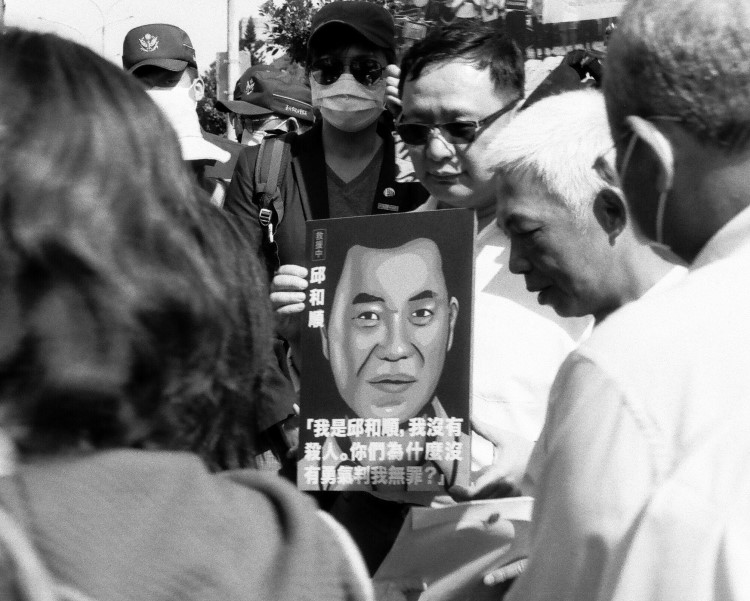國際特赦組織公布民調,近六成台灣民眾支持難民法
國際特赦組織台灣分會委託第三方機構執行民意調查,並於本日舉辦記者會公布結果。本場記者會也邀請到關注難民議題,並曾針對在台難民個案人權狀況進行調查的監察院紀惠容委員、監察院高涌誠委員、推動台灣人權的運動者艾琳達以及長期倡議難民法案與支持尋求庇護者的台灣人權促進會與台灣好鄰居協會出席記者會,共同呼籲行政院儘速提交難民法草案,並確保法案內容符合國際人權標準。
山水民調總經理何麗萍在記者會上說明:「為了更了解台灣民眾對難民法立法的認知與支持,我們接受國際特赦組織台灣分會的委託,於 2024 年 8 月底進行民意調查,並採用電話訪談的方式,共取得 1,078 位台灣 18 歲以上居民的代表性樣本。在 95% 的信心標準下,抽樣誤差約為±2.98 個百分點。調查結果也根據內政部的人口統計資料進行加權處理。」
「調查顯示:在未獲得與台灣難民立法相關資訊以前就有過半(52.4%)的受訪者支持難民法立法;而在受訪者獲得更多資訊,包括國際法對難民之定義、台灣難民的現況,以及法律草案的細節後,支持率增加至近六成(59.3%)。」
國際特赦組織台灣分會秘書長邱伊翎表示:「根據國家人權行動計劃,2024 年底之前,行政院應將法案送進立法院。而根據這份民意調查報告的結果顯示有近六成的台灣民眾表示支持難民法立法。因此,我們也希望政府遵循多數民意,兩公約審查的國際專家的建議,並且按照國家人權行動計畫的目標,將難民立法相關草案送交至立法院審議。」
監察院紀惠容委員提到過去針對「烏干達籍人民來台尋求難民庇護」一案發布的監察院調查報告,她表示:「有許多來台尋求庇護的人,是因為自己所屬的群體,例如同志身分,而在自己的國家受到迫害。然而,當他們來到對同志友善的台灣時卻因為沒有難民法,導致他們在無合法身分的情況下不能工作、無勞健保,更難以自力生活。」
國際特赦組織台灣分會秘書長邱伊翎也強調,讓難民及尋求庇護者長期處於非法及不受任何權利保障的情況,已經違反我國憲法第 15 條對於生存權的保障,而這個保障,並不區分國民與非國民。
監察院高涌誠委員強調:「通過難民法是國家人權行動計劃預計在今年底要完成的目標,不過台灣同樣也有義務遵循國際人權的標準,像是 1951 年《難民地位公約》,去制定對難民與尋求庇護者權利保障的法律。」
高涌誠委員也舉「金門三七事件」的例子說明:「面對國際情勢的變化,有許多人會因為戰爭的關係來到台灣。而過去我們從『金門三七事件』的經驗看到,在缺乏難民法及相關成熟法制之下,國家因此違反了國際人權義務。在保障人權與兼顧國家安全上國家有所考量是能理解的,不過若政府或是政治人物對於國安問題有擔憂的話,更應該透過將草案送到立法院進行全面性的討論來解決。」
在白色恐怖時期協助許多台灣良心犯的人權運動者艾琳達表示:「在過去的威權時代也有發生過台灣人前往日本尋求庇護,卻因為日本政府違反『不遣返原則』將這些人送回台灣,導致他們受到迫害與刑罰,台灣基於這個經驗,更不該重蹈覆轍;相較之下,也有許多台灣人逃亡至美國或歐洲尋求庇護,而正因為這些人成功獲得庇護並取得難民身分,例如彭明敏教授,他們才得以持續推動台灣人權進展的工作。」
台灣人權促進會難民議題專員賴彥蓉重申完整的庇護法制除了能保障難民權益,更能防範社會漏洞。賴彥蓉專員坦言:「在缺乏庇護制度的情況下,這些在台的難民缺乏基本生活保障,並因長期無法取得合法身分導致無法自立。如此,反而可能形成社會或國安漏洞,更恐將引發人權和安全問題。」
「我們呼籲政府加速推動難民法、改善現行庇護專案,建立安全的庇護系統,透過審查程序謹慎評估每位庇護者,並有效篩查可疑人士,也讓歷經苦難的人能獲得應有的照顧,讓這片土地成為不僅是自由之地,也是真正的避風港。」
台灣好鄰居協會專案經理賴司鐸表示該組織在 2022 年至 2024 年間與富邦文教基金會及外交部設立的國際合作發展基金會一起推動執行糧食發放和烏克蘭難民兒童心理支持計畫,關懷因戰爭而流離失所的烏克蘭難民兒童。
賴司鐸經理表示:「台灣積極加入國際社會的難民工作,除了緊急人道救援之外,更應在國內法制化難民庇護制度。在今年的『世界難民日研討會』裡,我們詢問王育敏立委關於《難民法》的立法進度,並建議政府應與世界人權接軌,王育敏立委也承諾會立刻著手推動立法。」
邱伊翎秘書長表示:「過去,民進黨洪申翰、沈伯洋等委員也都長期支持難民法的推動及建立相關審查及保護機制。雖然有些國家並未盡到國家對於難民保護的義務而衍生出人權侵害的問題,不過日本與同樣位於東亞的韓國,目前也都已經建立了難民法制,台灣更不應該在如此重要的人權議題上缺席。」
「除了 1951 年《難民地位公約》及其《議定書》所揭示的人權義務之外,台灣已經通過了《兩公約施行法》,我們呼籲台灣政府應落實兩公約審查的結論性意見和建議,並在 2024 年底前完成符合國際人權標準之難民及尋求庇護者保護法案的立法程序,同時加快審查現有的申請案件。」
記者會以彭明敏文教基金會所提供的紀錄片做結,從彭明敏教授在瑞典獲得難民庇護的歷史經驗,說明建立完整的難民庇護制度對於保護人權、確保流亡者在國外仍能持續進行海外的人權及國際救援行動的重要性。台灣在多數民意都支持的情況下,更應該依據兩公約的結論性意見及國家人權行動計劃,儘速讓已經延宕 20 年的難民法,完成相關程序及機制,以維護目前在國內已經存在的來自各國的受迫害的庇護個案的人性尊嚴。
國際特赦組織完整聲明(英)
Amnesty International Taiwan Poll Reveals Nearly 60% of Taiwanese Support Refugee Legislation
08 November 2024
Amnesty International Taiwan held a press conference on 8 November 2024 to present the findings of a commissioned survey that aimed to better understand Taiwanese public awareness and support for refugee legislation. The survey found that more than half (52.4%) of respondents supported a refugee law upfront. After respondents received additional information, including on the definition of refugees under international law, the current situation of refugees in Taiwan, and the draft law's details, support increased to nearly 60% (59.3%).
The National Immigration Agency (NIA) has employed specific measures and schemes to support asylum seekers from war-affected areas, including Myanmar and Ukraine, who wish to remain in Taiwan. However, as demonstrated by the individual cases received by Amnesty International Taiwan and other partner organisations, even those supported by schemes continue to face challenges when renewing their visa and unable to work or live in dignity.
The tabling of refugee legislation to the Legislative Yuan is therefore an important opportunity to make progress on rights protections, with a majority of public support, but Amnesty urges additional resources to increase public awareness and education about these issues.
Taiwanese still lack enough understanding of the challenges for asylum seekers in Taiwan
The survey was conducted by a third-party organisation, Focus Survey Research, at the end of August 2024. Using telephone interviews, it produced a representative sample of 1,078 residents aged 18 and over across Taiwan. With a 95% confidence level, the sampling error is approximately ±2.98 percentage points. The results were weighted based on demographic data from the Ministry of the Interior.
The results showed that over 70% of the public (74.1%) said they believed they understood the meaning of "refugee." However, many were unfamiliar with Taiwan's refugee situation and related information about refugee legislation — 65% of respondents were unaware that many foreign nationals in Taiwan are refugees and cannot return to their home countries because they would risk persecution due to their political opinion, nationality, religion race or membership of a political group, and over 80% (81.2%) did not know that Taiwan currently lacks refugee legislation. Additionally, nearly 90% (88.1%) were unaware that the three major political parties in Taiwan — DPP (Democratic Progressive Party), KMT (Kuomintang), and TPP (Taiwan People's Party) — had all proposed draft refugee legislation since 2005.
Moreover, only 18.7% of respondents knew that the refugee protection mechanism proposed in the draft legislation includes background checks on individual cases, while just 13.3% were aware that refugees who pass these checks would have the right to reside and work in Taiwan, paying taxes like other residents.
Taiwan’s international obligations: non-refoulement and protection of the right to asylum
Taiwan's existing laws lack provisions for non-refoulement. The principle of non-refoulement is a norm of customary international law that prohibits States from transferring or removing individuals from their jurisdiction or effective control when there are substantial grounds for believing that the person would be at risk of irreparable harm upon return, including persecution, torture, ill-treatment or other serious human rights violations.
Further, existing legislation fails to adequately protect the rights of refugees and stateless individuals in Taiwan. As of now, asylum seekers can obtain temporary relief from forced deportation through the one-year "Temporary Residence Certificate for Foreigners." However, this system does not guarantee other fundamental rights such as the right to work, health, and education.
Amnesty International has consistently called on the Taiwanese authorities to ensure the right to asylum and to protect asylum seekers and refugees, including by granting them legal status and ensuring they can enjoy their rights.
In June 2023, Amnesty International's Secretary-General Agnès Callamard visited Taiwan, where she explored efforts in Taiwan to address key human rights issues, including the challenges faced by refugees and asylum-seekers. At the time, she was clear that the lack of refugee legislation had “eminently negative” implications for all asylum-seekers, whatever their national origin, and urged the adoption of protection mechanisms specifically, and more broadly clear and transparent legal pathways for refugees to access all basic rights guaranteed by international human rights law.
Independent international human rights experts have repeatedly urged Taiwan to expedite the adoption of refugee legislation during three previous domestic “implementation reviews”. This process, unique to Taiwan, mirrors the UN treaty body review process to assess the implementation of Taiwanese legislation that directly incorporates the provisions of international human rights law: for the time being, specifically the International Covenant on Civil and Political Rights, the International Covenant on Economic, Social and Cultural Rights, and the International Convention on the Elimination of All Forms of Racial Discrimination.
Amnesty International Taiwan's section Director E-Ling Chiu stressed that the process of adopting refugee legislation has been delayed for 20 years, since a draft law was first proposed in 2005, despite repeated calls for progress by Taiwan’s civil society groups and exile communities. The government and most legislators have often cited "lack of social consensus" as a reason for the delays. However, the recent survey shows that nearly 60% of the public expresses support for the draft law after receiving some information about its contents. Therefore, she urged the Taiwanese government to promptly pass a refugee legislation that meets international standards.
“Protection of refugees is a pressing global issue, and Taiwan, which has consistently positioned itself to uphold international human rights standards, cannot remain indifferent. Without refugee legislation, Taiwan not only fails to fully make good on its commitments to protect and promote human rights of all within its jurisdiction, but it also risks breaching international obligations, such as the principle of non-refoulement. This would not merely endanger the lives and rights of foreign nationals but can also result in losses to Taiwanese society and the economy.”
Amnesty International calls on the government in Taiwan to implement all concluding observations and recommendations from domestic human rights reviews and to complete the legislative process for an internationally-compliant law on refugees and asylum seekers by the end of 2024, while also expediting the review of existing cases.
Background
Taiwan still lacks a refugee law; therefore, when an asylum case emerges, Taiwanese authorities can only handle it on a case-by-case basis with no clear procedure made publicly available for asylum seekers to follow, nor remedy for applicants to appeal.
Even though some judicial decisions have recognised the principle of non-refoulement, and some legal provisions offer Chinese, Hong Kong, and Macao people seeking asylum to obtain temporary resident permit, Taiwan does not provide asylum seekers with effective protection.
In 2013 and 2017, the International Review Committee on the Implementation of the International Human Rights Covenants (the “Committee”) recommended “the speedy adoption of a Refugee Act, which should also include the principle of non-refoulement.” In 2022, the Committee, again, recommended Taiwan to “consider the ratification of other universal human rights treaties, such as the 1951 Convention on the Status of Refugees and its Protocol.”



